GREAT F. SCOTT!
Elevator Repair Service’s justifiably heralded Gatz returns to The Public, opening tonight for a final New York City encore, and it’s congenial, unforgettable theater. Directed by John Collins, this single 6 1/2-hour production (more than 8 hours with the breaks) terrorized me at first because I can’t sit still for such a long time, but F. Scott Fitzgerald‘s The Great Gatsby is one of my favorite books, I knew the text was going to be the complete novel without any change, so I brought a pillow just in case this experience was a pain in the Gatz. There was no need to worry. If you also have an appetite for ambitious or unusual theater projects and, in particular, marathon theater events, it would be foolhardy to not to see it and savor every moment. Gatz never feels its length, and theater like this arrives once in a blue moon. You don’t want to miss a word-for-word of it.
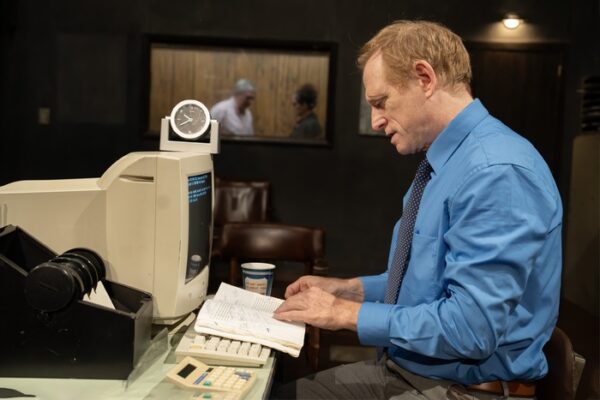 Scott Shepherd
Scott ShepherdOne morning in the office of a mysterious small business, an employee finds a copy of The Great Gatsby in the clutter on his desk. For reasons unknown, he starts to read the literary classic out loud and doesn’t stop. At first his coworkers — a very well-cast ensemble of 12 — hardly notice, but, after a series of strange coincidences, they appear to take on the roles of The Great Gatsby’s characters, and it’s no longer clear whether the reader, Nick Carraway, is reading the book or the book is transforming him.
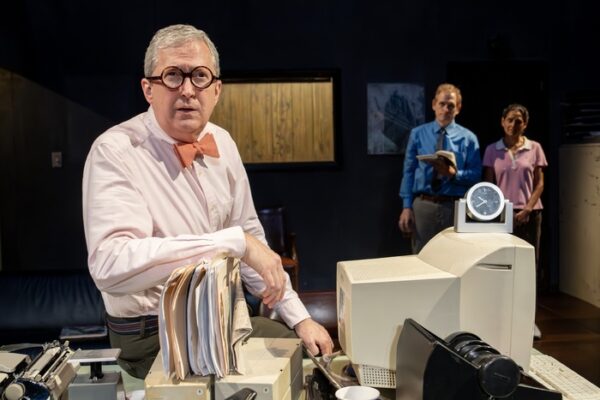 Vin Knight, Scott Shepherd, Susie Sokol
Vin Knight, Scott Shepherd, Susie SokolThere is only one set, the ramshackle office that has nothing to do with the lavish or charming backgrounds of the novel. Only shelving units filled with storage file boxes, a table, multiple chairs, a couch, file cabinets, an ‘80s computer — yet Collins’ direction and Louisa Thompson’s scenic design succeed in making it into the ideal sandbox.
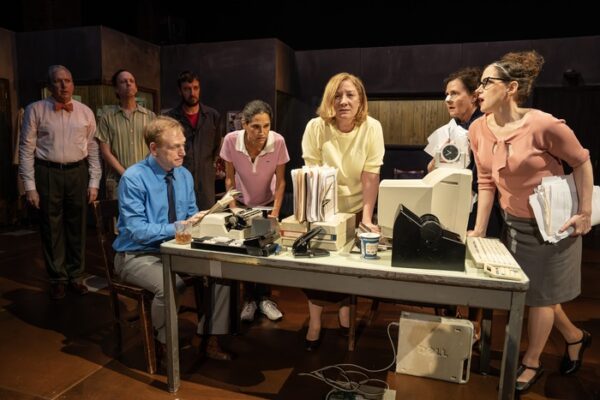 Vin Knight, Mike Iveson, Frank Boyd, Scott Shepherd, Susie Sokol,
Annie McNamara, Laurena Allan, and Maggie Hoffman
Vin Knight, Mike Iveson, Frank Boyd, Scott Shepherd, Susie Sokol,
Annie McNamara, Laurena Allan, and Maggie HoffmanYou probably know the story: Nick Carraway, a Midwestern young man who studied at Yale and served in the Army, is now selling bonds in New York. He moves to West Egg, Long Island, in a small cottage next to the opulent Gatsby sea-mansion where he experiences the destructive nature of wealth and greed within a tragic love-story. It’s Spring 1922 and New York is bathed in post-war optimism: construction is everywhere, businesses are flourishing, and jazz, parties, speakeasies, corruption, and speculation — the “Great Excess” before the Great Crash and the Great Depression. People from the Midwest, just like the disquieting but fascinating Daisy (Tory Vazquez) — Nick’s rich distant cousin and Gatsby’s obsession, and her morally questionable husband, Tom Buchanan (Pete Simpson), a former Yale football star and a millionaire. The Buchanans relocated from Chicago to a villa in the old money town of East Egg, before Gatsby built his estate across the bay in the hope that Daisy would visit. And that is just the set-up, not the events in the novel that I leave undisclosed in case you haven’t read it.
Laurena Allan, Scott Shepherd, Annie McNamara, and Maggie Hoffman
Scott Shepherd, who plays Nick, reads the entire book, adding a deeper dimension to the text. A gifted actor, he made me feel as if Fitzgerald himself is reading us the story. That is, the author’s life story as well as Gatsby’s, because the roman à clef novel portrays real people disguised as different characters. When Fitzgerald was 18, he left the Midwest to study at Princeton and there he met Ginevra, a young socialite, as Gatsby and Daisy are in the novel. They fell deeply in love, but her affluent father did not accept his lower-class status, so a disrupt Fitzgerald enlisted in the Army, hoping to die, and Ginevra married a wealthy Chicago businessman, exactly like Gatsby and Daisy. While stationed in Montgomery, the author found out about the wedding, so he asked another wealthy girl from Alabama to marry him, and this is the ludicrous and painful part: she postponed their marriage until he became a successful, therefore wealthy, writer. When it happened, years later, they moved to Great Neck, Long Island, where The Great Gatsby was created, and while the author still longed for Ginevra. Shepherd is able to embody both Nick and Fitzgerald’s personal and social commentaries while preserving the rhythms of the author’s prose, as well as his role as an office clerk. Although the intoxicating Shepard appears to be reading directly from the novel, he actually has the entire work memorized.
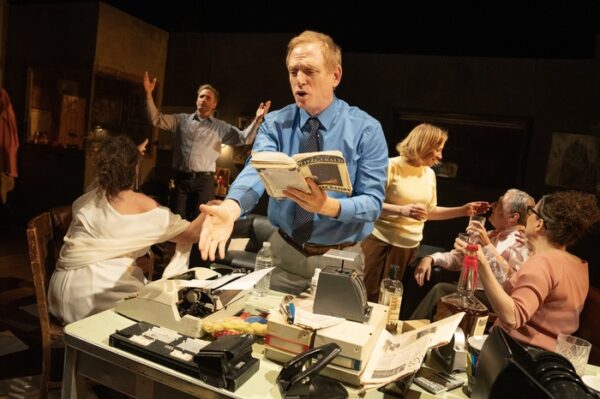 Scott Shepherd and company members
Scott Shepherd and company membersNew York was a booming city, where you could catch a movie or a show with Armstrong, Ellington, Waller, Berlin, or Gershwin to name a few. Causing rage and backlash among the conservatives, women drank and smoked in public, voted, drove cars, cut their hair short in bob styles to expose their necks, and shortened their skirts to expose their knees. Daisy’s close childhood friend, Jordan Baker, played by a determined Susie Sokol, is the archetype of the modern woman, a golf champion who lives with the Buchanans when she is not in a tournament. The stock market was the temple of shameful greed and speculation, just like our times, making billions for the wealthy who lived lavishly and built mansions everywhere. Everybody thought the market would never stop rising. Until, that is, Black Monday 1929. The poor, of course, were seriously struggling throughout the Roaring Twenties, living in “valleys of ashes” (as Fitzgerald called Flushing Meadow), or in overcrowded tenements.
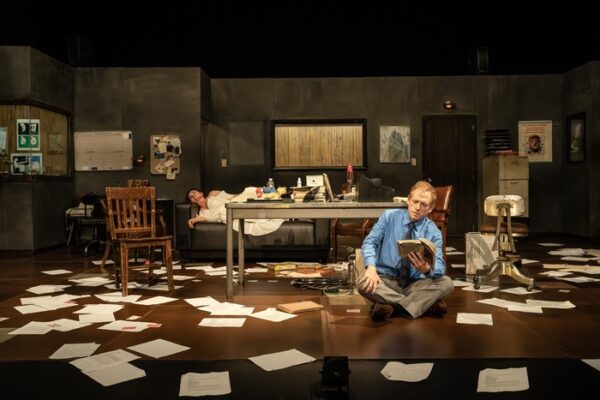 Scott Shepherd
Scott ShepherdWhich takes us to Young Myrtle (Laurena Allan) who is married to George (Frank Boyd), an absent-minded grubby mechanic who works in a garage attached to their house. They live in a “valley of ashes” — a garbage dump on the way to the city where the American dream died. Myrtle sees a way out of her misery by entertaining a tryst with Daisy’s rich husband Tom Buchanan, who has rented a small apartment for her in the city so they can see each other and party with Myrtle’s sister Catherine (Annie McNamara) and other lower class people trying to raise themselves above their station, photographer Chester McKee (Vin Knight) — a “pale feminine man from the flat below” — and his wife Lucille (Maggie Hoffman), a couple of fun gossipers.
Scott Shepherd, Pete Simpson, and Jim Fletcher
Jim Fletcher is Gatsby, the enigmatic multi-millionaire. Bootlegging via the New York Jewish Mafia is the illicit source of his fortune, which he has to keep secret if he wants to win back Daisy. He is alone in this immense palace built only to impress her, populated by strangers who party there at night, allured by the seduction that lurks beneath wealth, and servants who clean and maintain some sort of normality in the place. Ewing (Mike Iveson), a pianist, is the only other soul that resides at the mansion from time to time. In the end, Gatsby’s father Henry (a moving Ross Fletcher) seems to be the only one who truly admires his son.
Tory Vazquez, Jim Fletcher, and Pete Simpson
Ben Jalosa Williams is Michaelis, a Greek man who owns a café next to Wilson’s garage. Impassive, mostly sitting at a table with a mixer and a few props, Williams as Foley artist makes sure that the many needed sounds landed on time at the right range – trains, foghorns, birds, and car crashes. Mark Barton’s lighting design is minimalistic and efficient, a bit too dark at times (especially for a long play in a large theatre) and Colleen Werthmann’s costume design is middle-of-the-road office wear that, for its cuts and colors, can pass as Roaring Twenties attire, a smart choice.
Gatz doesn’t feel like a staged reading or an audio book because the dedicated actors use their bodies as much as their words to stage it. They are all in perfect sync, creating lavish parties, car trips, accidents, and intimate moments, with just a few props and a lot of heart. Gatz is different than most theater in that it’s a true experience. Even if almost 100 years have passed since Fitzgerald’s novel was published, our country hasn’t changed much; we may be repeating history. Can a great novel become a great day in the theater? ERS has proved, with Gatz, that it most definitely can.
photos by Joan Marcus
Gatz
The Public Theater’s Newman Theater, 425 Lafayette Street
8 hours (includes 2 intermissions and one 90-minute dinner break)
ends on December 1, 2024
Wed, Fri & Sat at 3; Sun at 2; Tues at 3 (Nov. 26); dark Nov. 27
for tickets ($160-$210, incl. fee), call 212.967.7555 or visit The Public

